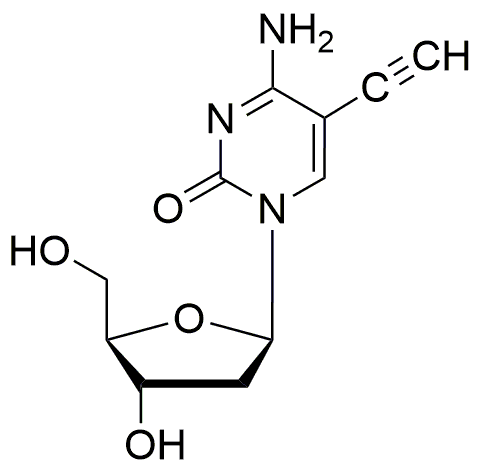5-Ethynyl-2'-deoxycytidine is widely utilized in research focused on:
- Antiviral Research: This compound is a key player in developing antiviral therapies, particularly against hepatitis B and HIV. Its ability to inhibit viral replication makes it a valuable tool for researchers in virology.
- Oncology Studies: It is used in cancer research to study DNA synthesis and repair mechanisms. By incorporating this compound into DNA, scientists can investigate tumor cell behavior and potential therapeutic targets.
- Genetic Engineering: The compound serves as a building block for modified nucleotides in CRISPR and other gene-editing technologies. This application enhances precision in genetic modifications, making it crucial for biotechnology advancements.
- Pharmaceutical Development: It plays a role in the formulation of nucleoside analogs, which are essential in creating new drugs for treating various diseases, including cancer and viral infections.
- Diagnostic Tools: Researchers use this compound in developing sensitive assays for detecting nucleic acids. Its incorporation into probes allows for improved specificity and sensitivity in molecular diagnostics.
General Information
Properties
Safety and Regulations
Applications
5-Ethynyl-2'-deoxycytidine is widely utilized in research focused on:
- Antiviral Research: This compound is a key player in developing antiviral therapies, particularly against hepatitis B and HIV. Its ability to inhibit viral replication makes it a valuable tool for researchers in virology.
- Oncology Studies: It is used in cancer research to study DNA synthesis and repair mechanisms. By incorporating this compound into DNA, scientists can investigate tumor cell behavior and potential therapeutic targets.
- Genetic Engineering: The compound serves as a building block for modified nucleotides in CRISPR and other gene-editing technologies. This application enhances precision in genetic modifications, making it crucial for biotechnology advancements.
- Pharmaceutical Development: It plays a role in the formulation of nucleoside analogs, which are essential in creating new drugs for treating various diseases, including cancer and viral infections.
- Diagnostic Tools: Researchers use this compound in developing sensitive assays for detecting nucleic acids. Its incorporation into probes allows for improved specificity and sensitivity in molecular diagnostics.
Documents
Safety Data Sheets (SDS)
The SDS provides comprehensive safety information on handling, storage, and disposal of the product.
Product Specification (PS)
The PS provides a comprehensive breakdown of the product’s properties, including chemical composition, physical state, purity, and storage requirements. It also details acceptable quality ranges and the product's intended applications.
Certificates of Analysis (COA)
Search for Certificates of Analysis (COA) by entering the products Lot Number. Lot and Batch Numbers can be found on a product’s label following the words ‘Lot’ or ‘Batch’.
*Catalog Number
*Lot Number
Certificates Of Origin (COO)
This COO confirms the country where the product was manufactured, and also details the materials and components used in it and whether it is derived from natural, synthetic, or other specific sources. This certificate may be required for customs, trade, and regulatory compliance.
*Catalog Number
*Lot Number
Safety Data Sheets (SDS)
The SDS provides comprehensive safety information on handling, storage, and disposal of the product.
DownloadProduct Specification (PS)
The PS provides a comprehensive breakdown of the product’s properties, including chemical composition, physical state, purity, and storage requirements. It also details acceptable quality ranges and the product's intended applications.
DownloadCertificates of Analysis (COA)
Search for Certificates of Analysis (COA) by entering the products Lot Number. Lot and Batch Numbers can be found on a product’s label following the words ‘Lot’ or ‘Batch’.
*Catalog Number
*Lot Number
Certificates Of Origin (COO)
This COO confirms the country where the product was manufactured, and also details the materials and components used in it and whether it is derived from natural, synthetic, or other specific sources. This certificate may be required for customs, trade, and regulatory compliance.


